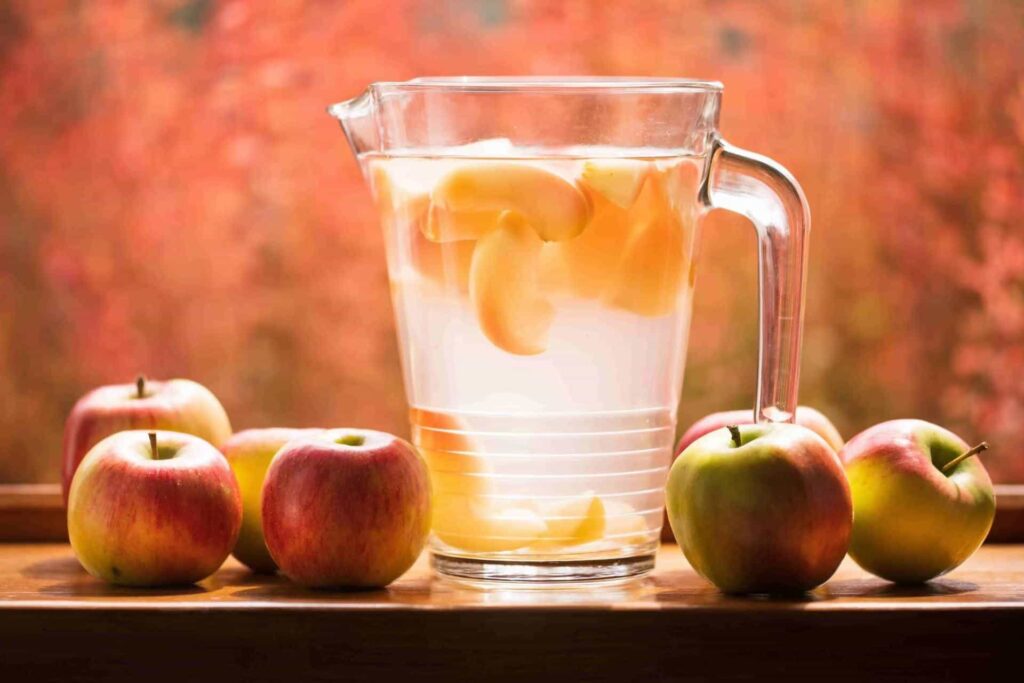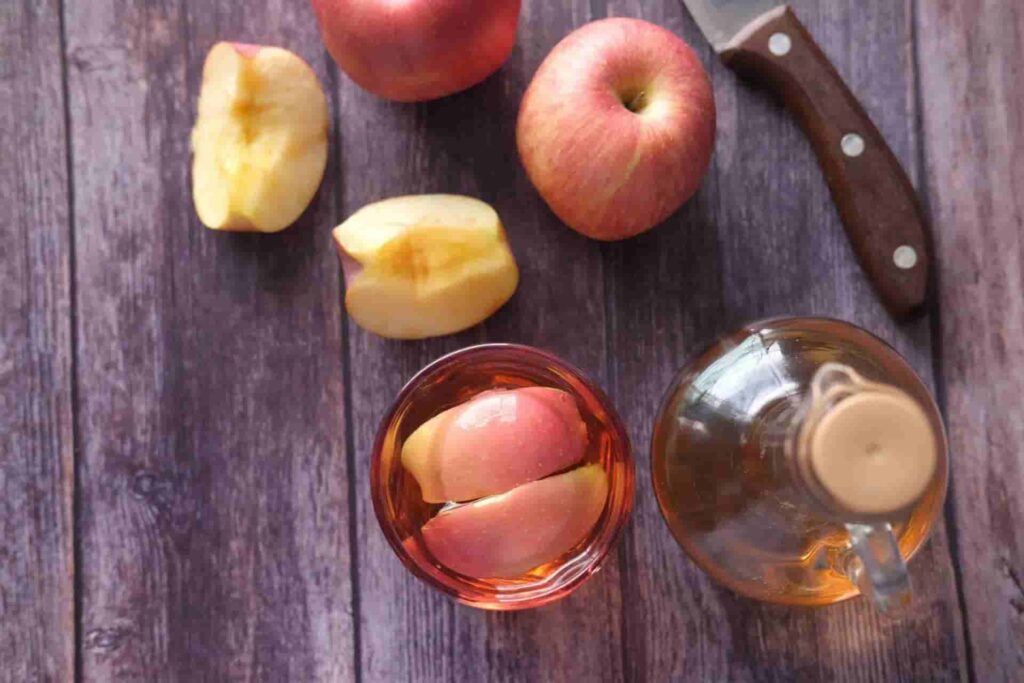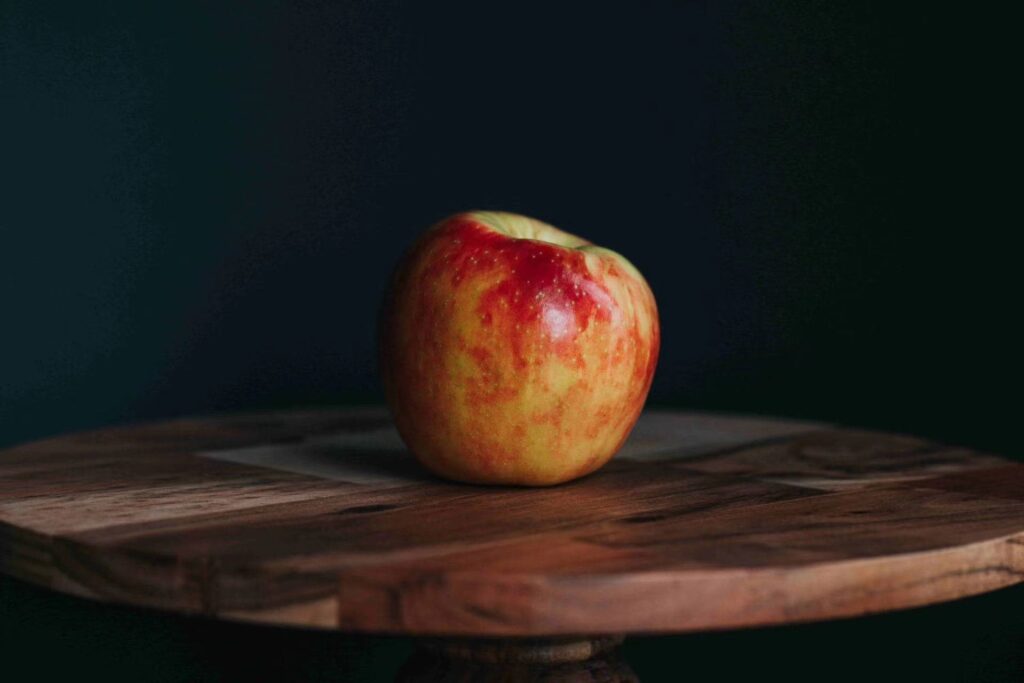The discovery of apple cider vinegar, like many other vinegar types, is believed to have occurred by accident thousands of years ago. The exact origin story is not documented, but the process of vinegar formation is a natural one and can occur whenever fermented liquids are exposed to air.
People have been fermenting alcoholic beverages for thousands of years. The first step in making apple cider vinegar — fermenting apples into cider — was likely a common practice. If this cider was left exposed to air for an extended period, natural airborne bacteria, particularly Acetobacter, would have interacted with it. These bacteria convert the alcohol present in the cider into acetic acid, which is the primary component of vinegar. Ancient peoples might have noticed the change in the cider’s taste and properties over time. Recognizing the preservative and flavoring qualities of this transformed liquid, they could have begun to use it intentionally.
Historically, vinegar was valued not just as a food ingredient but also for its medicinal properties. It was used as a remedy for various ailments and as a preservative for food and drinks. Hippocrates, often referred to as the father of modern medicine, is known to have used vinegar around 400 B.C. for its health benefits, particularly for cleaning wounds. Though not specified as apple cider vinegar, this shows the long-standing medicinal value of vinegar in general.
Section 1 How Does Apple Cider Vinegar Made in Modern Kitchen
Apple cider vinegar, a staple in many kitchens and wellness routines, is crafted through a fascinating process that transforms simple apples into a potent and versatile vinegar.
▶ The Process of Making Apple Cider Vinegar
Apple cider vinegar, a staple in many kitchens and wellness routines, is crafted through a fascinating process that transforms simple apples into a potent and versatile vinegar.
○ Harvesting and Preparation of Apples: The journey begins with the selection of quality apples. These apples are harvested, cleaned, and then crushed to extract their juice. The variety and quality of apples used can influence the flavor and quality of the final vinegar.
○ First Fermentation – Alcohol Formation: The extracted apple juice is then subjected to fermentation. During this stage, natural or added yeasts convert the sugars present in the apple juice into alcohol, essentially turning it into cider. This process typically takes a few days to a week.
○ Second Fermentation – Acetic Acid Formation: After the alcohol is formed, the liquid undergoes a second fermentation process. This time, Acetobacter, a type of bacteria, is introduced. These bacteria convert the alcohol into acetic acid, the main active compound in vinegar. This acetic acid fermentation can take several weeks to a few months, depending on the desired strength and flavor profile of the vinegar.
○ Aging for Flavor Development: Once the second fermentation is complete, the apple cider vinegar may be aged further to develop its flavor. This aging process can vary, with some varieties resting for up to several months.
○ Filtering and Bottling: The final step involves filtering the vinegar to remove any sediment and mother of vinegar (a natural cellulose formed by the bacteria) if desired. The clear vinegar is then bottled, often in glass containers to preserve its quality and extend its shelf life.

Each step in the process contributes to the unique characteristics of apple cider vinegar, including its tart taste, fruity undertones, and potential health benefits. The slow, natural fermentation process is key to developing the complex flavors and beneficial properties that make apple cider vinegar a sought-after product in health, culinary, and beauty applications.
Section 2 Benefits of Apple Cider Vinegar
2.1 Benefits of Apple Cider Vinegar
Apple cider vinegar (ACV) has been celebrated for its potential health benefits, which have made it a popular ingredient in many health and wellness practices. Here’s a closer look at some of these purported benefits:
○ Digestive Aid: ACV is often touted for its ability to aid digestion. The theory is that its acidic nature can help with the breakdown of food, potentially improving digestive efficiency. Some people use it as a digestive tonic, believing it can help with bloating and indigestion.
○ Blood Sugar Regulation: One of the most researched benefits of ACV is its potential impact on blood sugar levels. Studies have suggested that it can help improve insulin sensitivity and lower blood sugar responses after meals, making it a topic of interest for managing blood sugar, particularly in the context of diabetes and prediabetes.
○ Weight Management: ACV is sometimes included in weight loss diets. It’s believed that acetic acid in ACV may help with weight management by reducing appetite and increasing feelings of fullness, leading to a natural reduction in calorie intake.
○ Skin Health: Due to its antibacterial properties, ACV is often used in skincare routines. It is believed to help balance the skin’s pH and improve the skin’s barrier, making it popular for treating acne and improving overall skin health.

○ Heart Health: Preliminary studies suggest that ACV might help improve heart health by lowering cholesterol and triglyceride levels. However, more research is needed in this area to fully understand its effects.
○ Antimicrobial Properties: ACV has been used historically for its antimicrobial properties. It can kill pathogens, including bacteria, which is why it has been used for cleaning and disinfecting, and treating nail fungus, lice, warts, and ear infections.
2.2 Bragg Apple Cider Vinegar
Bragg apple cider vinegar, a popular brand of organic ACV, often comes up in discussions about ACV benefits. This brand is known for its quality and is often used as a benchmark for comparing other apple cider vinegar products.
2.3 Precautions
While ACV offers several potential health benefits, it’s important to use it with caution. Its high acidity can damage tooth enamel and irritate the throat. It’s recommended to dilute it in water and consume it in moderation.

Section 3 Why Glass Packaging for Organic Apple Cider Vinegar?
Choosing glass packaging for organic apple cider vinegar (ACV) is a decision influenced by several key factors that align with preserving the quality, ensuring safety, and maintaining the integrity of the product. Here’s why glass is often the preferred choice:
3.1 Chemical Inertness and Non-Reactivity
Glass is chemically inert, meaning it does not react with the ACV inside. This non-reactivity ensures that the vinegar retains its flavor, potency, and quality over time. Unlike some plastics, glass does not leach chemicals into its contents. This is crucial for maintaining the organic and pure nature of the ACV, especially important for consumers seeking natural and uncontaminated products.
3.2 Protection from Contaminants and UV Light Protection
Glass provides an effective barrier against oxygen and other environmental contaminants. This protection is essential for preserving the vinegar’s properties and preventing degradation. Certain types of glass, like amber glass, can protect the ACV from UV light, which can degrade some of its beneficial components. This is particularly important for organic ACV, which often contains more delicate compounds that can be sensitive to light.

3.3 Sustainability
Glass is 100% recyclable and can be recycled indefinitely without loss of quality or purity. This aspect aligns well with the environmentally conscious values of many consumers who opt for organic products. Using glass instead of plastic helps reduce the environmental impact of plastic pollution, an important consideration for eco-friendly brands and consumers.
3.4 Aesthetic and Branding Benefits
Glass bottles often have a more premium and high-quality appearance compared to plastic. This can enhance the brand image, especially for organic products that often occupy a higher-end market segment. Glass packaging offers versatile options for customization in terms of shapes, sizes, and labeling, allowing brands to stand out on the shelves and reinforce their identity.

3.5 Consumer Perception
Consumers often perceive glass-packaged products as being of higher quality. There’s a trust factor associated with glass, particularly when it comes to storing consumables like organic ACV, which is valued for its health benefits.

Section 4 How to Select the Perfect Glass Containers
When choosing glass containers for your brand, several factors must be considered:
▶ Bottle Color
○ Clear Glass: Ideal for showcasing the natural color and clarity of the vinegar.
○ Amber Glass: Protects from light, preserving the vinegar’s quality.
▶ Size Variations
○ Gallon Apple Cider Vinegar Glass Bottles: Suitable for bulk storage or large-scale use.
○ Smaller Bottles: Perfect for retail shelves, offering convenience to consumers.
▶ Lid Types
○ Screw Caps: Ensure a tight seal, preserving the product’s freshness.
○ Pour Spouts: Ideal for user convenience, especially in a culinary setting.

Smilebottles’ Promise
Selecting the right glass packaging for apple cider vinegar is essential in preserving both its quality and appeal. By thoughtfully choosing aspects such as bottle color, size, and lid type, brands can effectively address the needs and preferences of their target audience, which includes beverage and juice brands, as well as wholesalers of empty glass bottles. Opting for glass packaging is not just about maintaining the integrity and benefits of apple cider vinegar; it also resonates with a commitment to environmentally friendly practices. For customers seeking to purchase high-quality glass bottles of apple cider vinegar in bulk, we invite you to contact us. Our team at Smilebottles is ready to discuss your specific needs and provide tailored solutions that align with your brand’s vision and values. Let’s collaborate to package your apple cider vinegar in a way that reflects quality, sustainability, and excellence.











